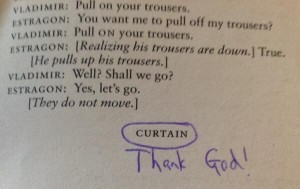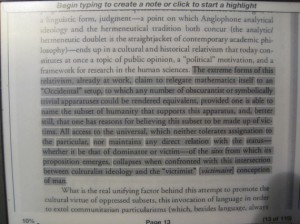Following my previous post in which I mentioned marginalia, I thought I would share some of Simon Rowberry’s recent tweets (@sprowberry), incorporating photographs of some amusing and telling examples of this phenomenon. Having recently turned my attention to the highlighting facility on the Amazon Kindle, I thought it might be interesting to compare some aspects of the two.


Simon’s examples of marginalia showed how potentially subversive this practice can be. Of course Joe Orton and Kenneth Halliwell have been credited with developing this into an art form, but it reminded me that on occasion I too have been known to scribble or draw the odd expression of frustration in my own travels as a reader. My objection to ereaders in the past had always been the lack of an annotation tool, as I had always felt that the ability to write notes on the text was crucial to my sense of myself as a critical reader. I also felt that writing notes personalised the text, and made it mine. Scurrilous comments may more specifically have been a feeble act of rebellion against the academy, and perhaps even a railing against the very notion of reading as a morally improving, earnest and enlightening activity. Though such acts of defiance may become public (by sharing the book or, less likely, by someone taking the trouble to photograph a comment and share it via Twitter!), they carry with them the quality of a private joke, a sneaky aside and a means of expressing taboo thoughts and feelings that perhaps couldn’t or shouldn’t be openly shared.
Still a novice, I find highlighting and commenting on the Kindle highly impersonal, even though in theory at least more people are likely to see and respond to my annotations. I have recently started to highlight passages as I am reading, but haven’t yet used the public notes facility. So far highlighting seems to me to lack the spontaneity of marginalia and is also much more limited (you can’t draw a picture in the margins of a book on kindle).
However, since I started reading more and more on screen, I seem to have lost the impulse to annotate (though I have become addicted to editing typos). Perhaps this is because my recent research has taken me away from the close reading which dominated so much of my early career. But just as I learned to live without the audio cassettes personally compiled, curated and annotated by my friends, I seem to be learning to engage with texts in a new way, thinking less about them as objects to be marked, and becoming less concerned about the idea of ‘owning’ them (because of course, we don’t, in any real sense with the Kindle).
